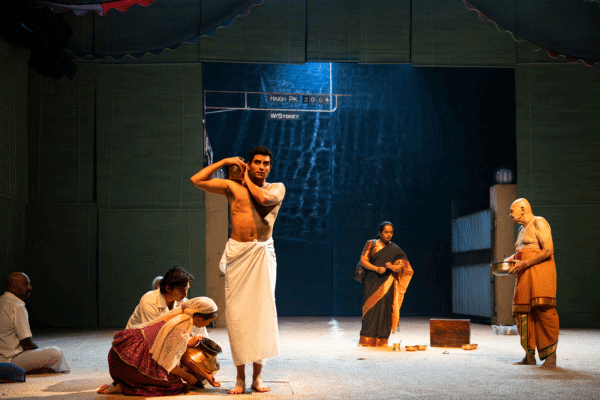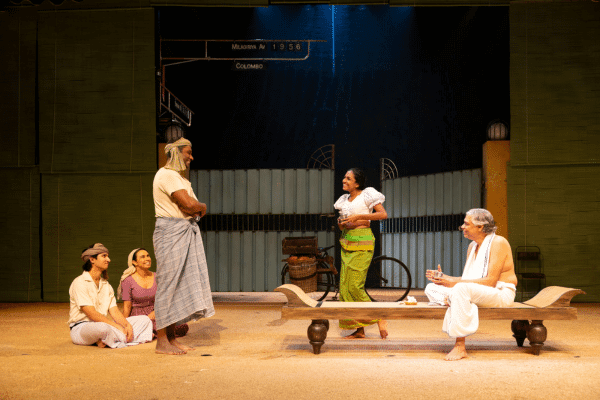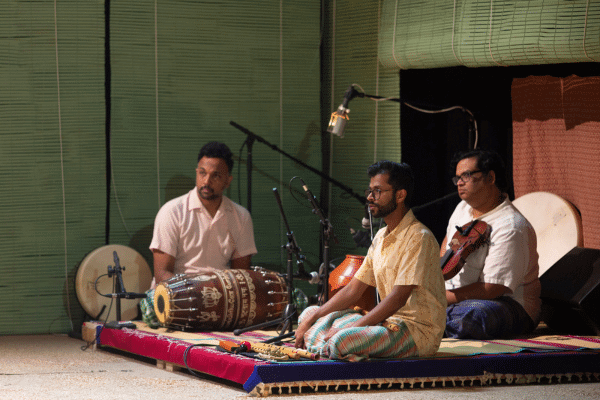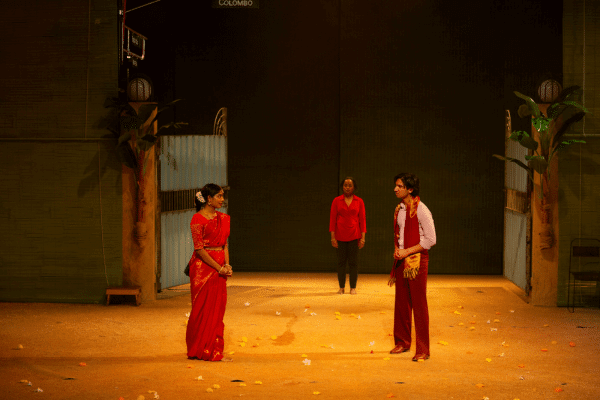Counting and Cracking, written by S.Shakthidharan and directed by Eamon Flack is an expansive tale which simultaneously delves into the intimate dynamics of family life whilst giving a detailed overview of the political turmoil within Sri Lanka. First performed in 2019 in Australia, it has since amassed a range of awards, including seven Helpmanns, and is being showcased once more in Sydney.
The play is masterfully structured such that the past transitions into the year 2004 and vice versa, seamlessly. While there is no central character, arguably, the older Radha, played powerfully by Nadie Kammallaweera, is the anchor of this story as she is the sole character in 2004 who is haunted by the violence within Sri Lanka. She therefore straddles both the present where she struggles to connect with her son Siddhartha (Shiv Palekar) and the past. Nevertheless, Radha must face her history after receiving a phone call which changes both her and Siddhartha’s life. Both Nadie Kammallaweera and Radhika Mudaliyer, who plays the young Radha, are equally powerful in their delivery of dialogue. They have such a commanding presence that one can’t help but be drawn to them even in moments when they are silent.

A common conflict that is faced by both the characters in the present and in the past is how to reconcile two different cultures. This was an issue faced by Sri Lanka upon independence as the country was left divided, with the Sinhalese majority and the Tamil community struggling to reconcile. Meanwhile, Siddhartha must try to harmonise his Australian identity with both his Sri Lankan heritage and his girlfriend’s Indigenous culture (Abbie-Lee Lewis). Siddhartha unwittingly embraces the principle of which his great-grandfather (Prakash Belawadi) was an active proponent. That is, that there can be unity regardless of individual differences of race, language or culture. One of the most compelling performances was given by Prakash Belawardi whose transformation from an optimistic and principle-driven man, to one who has been disillusioned, is subtle and culminates into a powerful monologue which he performs evocatively.
Shiv Palekar’s performance as Siddhartha was also notable as he is able to fulfil his role as the foil to Radha through his somewhat immature physicality, a permanent feature of which is his sustained slouch, as well as through his ability to convey humour. His performance thus accurately depicts a character who is yet to fully grow into an adult.
Counting and Cracking boasts around 50 characters, with most performers playing dual roles whilst acting as translators onstage, where they skillfully echo the expressions of the performers who speak in dialect. As one of the key focuses of this play is language, this was an apt decision on behalf of Shakthidharan and Flack in highlighting that language barriers are not necessarily impediments to human connection.

Eamon Flack’s decision to keep the sets simple and to instead rely on props which are hand-held by the actors themselves to set the scene is apt, as it allows for a seamless transition between the past and the present. One of the permanent features of the set is the large green gates, which signify the gates of Radha’s ancestral home and which in the context of the 2004 narrative, signifies the gate to the past. Additionally, there are street signs at the top of the stage, which swing to indicate both the place and time. Arguably, this is not needed as the lighting of the set which changes from a cold white light to a warmer orange light to signify the change from Sydney to Sri Lanka, as well as an older Radha, is enough to signify to the audience that there has been a shift back to 2004.
With the subject of Sri Lankan politics and migration at its heart, Counting and Cracking may seem like a heavy show, but Shakthidharan tastefully weaves in moments of comedy in unexpected places, thus adding levity to an otherwise emotionally charged story. The play is replete with the breaking of the fourth wall, meta-textual references and instances where the characters interact with their translators. Besides the storytelling elements, Flack has ensured that all elements of the production have their moment to shine. Even the musicians are not relegated to merely setting the atmosphere of the story, but are actively involved in creating moments of humour. The live band was composed of Janakan Suthanthiraraj, Venkhatesh Sritharan and Kranthi Kiran Mudigonda who played the mridangam, carnatic flute and violin respectively to emphasise and foreshadow moments of joy and terror.

During several points of the play, Australia has been referred to as somewhat of a safe haven. These instances serve as a stark reminder of Australia’s historical attitudes towards refugees which have been criticised as contradictory, confusing and in some circumstances as unduly harsh. The presentation of the horrors of civil war in unflinching detail serves as a stark reminder of the need for urgent law reform.
Ultimately, Counting and Cracking is about the dangers of the personal and political narratives that we abide by and what happens when these carefully constructed narratives are shattered by the unthinkable. While some may suggest that it is contradictory to call a play centred around Sri Lanka as a uniquely Australian tale, its exploration of migration, cultural identity and the limits of democracy are all issues which have long been central to the Australian consciousness.
READ MORE: Why we need a new kind of Nayika (heroine)




